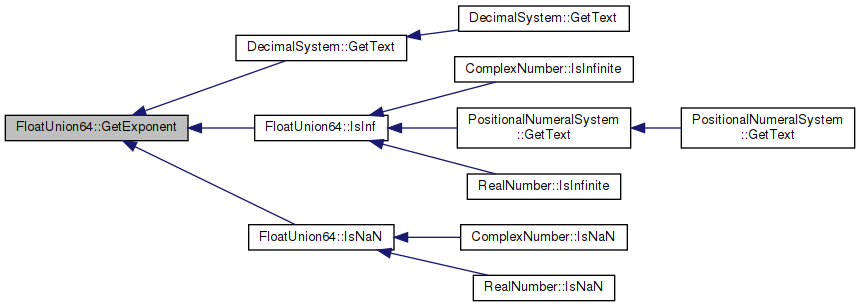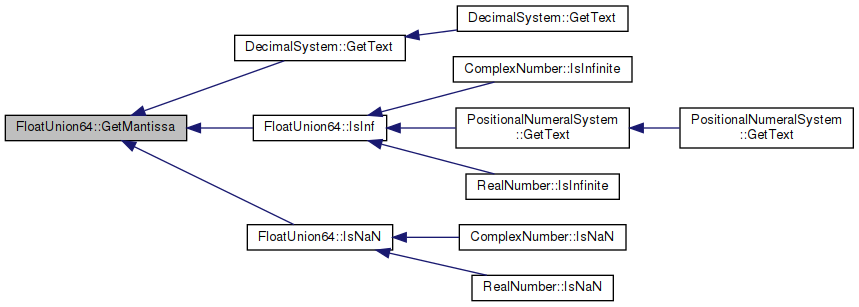#include <numb.h>
Public Member Functions | |
| bool | IsNegative () const |
| bool | IsZero () const |
| bool | IsInf () const |
| bool | IsNaN () const |
| bool | IsMaxPositive () const |
| bool | IsMaxNegative () const |
| int32_t | GetExponent () const |
| uint64_t | GetMantissa () const |
Public Attributes | |
| double | floatingPoint |
| uint64_t | integer |
Detailed Description
Member Function Documentation
◆ GetExponent()
|
inline |
◆ GetMantissa()
|
inline |
◆ IsInf()
|
inline |
Definition at line 47 of file numb.h.
References GetExponent(), and GetMantissa().
Referenced by PositionalNumeralSystem::GetText(), RealNumber::IsInfinite(), and ComplexNumber::IsInfinite().


◆ IsMaxNegative()
|
inline |
Definition at line 50 of file numb.h.
References integer.
Referenced by ComplexNumber::IsInfinite(), and RealNumber::IsInfinite().

◆ IsMaxPositive()
|
inline |
Definition at line 49 of file numb.h.
References integer.
Referenced by ComplexNumber::IsInfinite(), and RealNumber::IsInfinite().

◆ IsNaN()
|
inline |
Definition at line 48 of file numb.h.
References GetExponent(), and GetMantissa().
Referenced by ComplexNumber::IsNaN(), and RealNumber::IsNaN().


◆ IsNegative()
|
inline |
Definition at line 45 of file numb.h.
References integer.
Referenced by DecimalSystem::GetText(), RealNumber::IsNegative(), and ComplexNumber::IsNegative().

◆ IsZero()
|
inline |
Definition at line 46 of file numb.h.
References integer.
Referenced by ComplexNumber::IsZero(), and RealNumber::IsZero().

Member Data Documentation
◆ floatingPoint
| double FloatUnion64::floatingPoint |
Definition at line 53 of file numb.h.
Referenced by DecimalSystem::GetText(), PositionalNumeralSystem::GetText(), ComplexNumber::IsInfinite(), RealNumber::IsInfinite(), RealNumber::IsNaN(), ComplexNumber::IsNaN(), RealNumber::IsNegative(), ComplexNumber::IsNegative(), ComplexNumber::IsZero(), RealNumber::IsZero(), and RealNumber::RealNumber().
◆ integer
| uint64_t FloatUnion64::integer |
Definition at line 54 of file numb.h.
Referenced by GetExponent(), GetMantissa(), IsMaxNegative(), IsMaxPositive(), IsNegative(), IsZero(), and RealNumber::RealNumber().
The documentation for this union was generated from the following file:
- src/lib/numb.h


